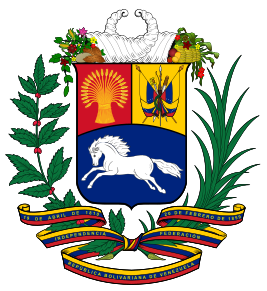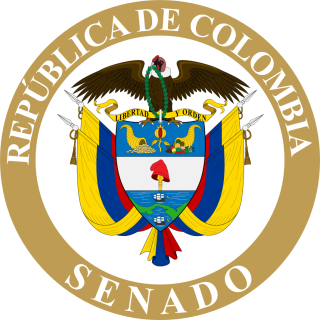A constitutional amendment is a modification of the constitution of a polity, organization or other type of entity. Amendments are often interwoven into the relevant sections of an existing constitution, directly altering the text. Conversely, they can be appended to the constitution as supplemental additions (codicils), thus changing the frame of government without altering the existing text of the document.

A referendum, in the Italian legal system is a request directed to the whole electorate to express their view on a determined question. It is the main instrument of direct democracy in Italy.

The Constitution of the Bolivarian Republic of Venezuela is the current and twenty-sixth constitution of Venezuela. It was drafted in mid-1999 by a constitutional assembly that had been created by popular referendum. Adopted in December 1999, it replaced the 1961 Constitution, the longest-serving in Venezuelan history. It was primarily promoted by then President of Venezuela Hugo Chávez and thereafter received strong backing from diverse sectors, including figures involved in promulgating the 1961 constitution such as Luis Miquilena and Carlos Andrés Pérez. Chávez and his followers (chavistas) refer to the 1999 document as the "Constitución Bolivariana" because they assert that it is ideologically descended from the thinking and political philosophy of Simón Bolívar and Bolivarianism. Since the creation of the Constituent National Assembly in August 2017, the Bolivarian government has declared the 1999 constitution suspended until a new constitution is created.

The Romanian presidential impeachment referendum of 2007 was conducted in order to determine whether the president of Romania Traian Băsescu should be forced to step down.

The constitutional history of Colombia is the process of formation and evolution of the different constitutions that Colombia has had since its formation.

A constitutional referendum was held in Kyrgyzstan on 21 October 2007, following the constitutional crisis caused by amendments passed since the Tulip Revolution in 2005 being invalidated by the Constitutional Court of Kyrgyzstan on 14 September 2007. Voters were asked whether questions on a new constitution and electoral law. Both were approved by over 95% of voters.

The 2009 referendum was a vote in which the citizens of Venezuela approved Amendment No. 1 of the Constitution of Venezuela; this abolished term limits for the offices of President, state governors, mayors and National Assembly deputies.

The Moldovan referendum of 2010 was a nationwide referendum in Moldova held on 5 September on whether or not the country should amend the Constitution of Moldova to return to direct popular election of the president. Since 2001, the president had been indirectly elected by Parliament, with a supermajority of 61 seats required for election.. The voters are asked to answer the following question "Would you agree with the Constitutional amendment, which would allow the election of the President of the Republic of Moldova by the entire population?", voting for one of the proposed options: “Yes (for)” or “No (against)”. Of those who had cast their vote, 87.83% chose "Yes". However, the referendum did not pass because only 30.29% of voters turned out, short of the necessary 33% for the referendum to be considered valid.

A referendum on electoral reform was held in Botswana on 4 October 1997. The referendum had three separate proposals, and came following promises made by President Quett Masire after violent protests in 1995. All three proposals were passed, although voter turnout was only around 17%.
The 1993 Brazilian constitutional referendum was held on April 21, 1993 to determine the form of government of the country. After the re-democratization of Brazil, an article in the new Constitution determined the holding of a referendum for voters to decide if the country should have a republican or a monarchical form of Government, and if the system of Government should be that of a presidential Executive or that of parliamentary government.

A referendum on the electoral law was held in San Marino on 3 July 2005. Voters were asked four questions on changes to the electoral law and electoral system. Although all four were approved by a majority of those voting, voter turnout was just 21.7%, meaning that the quorum of 32% of registered voters (10,143) was not achieved for any question. This resulted in all four questions failing, including two that proposed raising the quorum to 40%.

A constitutional referendum was held in the Federated States of Micronesia on 27 August 2002. Voters were asked whether they approved of 14 separate amendments to the country's constitution. To be approved, the proposal required at least 75% of voters in at least three of the four states to vote in favour. Ultimately all 14 proposals were rejected, as none passed the 75% threshold in any state.

A referendum on electing a Constitutional Assembly was held in Colombia on 27 May 1990 alongside presidential elections. The proposal was approved by 96% of voters. A Constitutional Assembly was later elected in December 1990 and produced the 1991 constitution.

A fourteen-part referendum was held in Ecuador on 25 May 1997. Voters were asked whether they approved of the dismissal of President Abdalá Bucaram by the National Congress, the appointment of Fabián Alarcón as interim President for twelve months, the calling of a Constitutional Assembly, whether a Constitutional Assembly should be elected by direct elections or by appointment, whether spending limits should be introduced for election campaigns, whether voters should be able to modify electoral lists, whether National Assembly elections should be held alongside the first or second round of presidential elections, whether political parties that fail to cross the 5% threshold in two consecutive elections should be deregistered, whether the Supreme Electoral Tribunal (TSE) should reflect the political makeup of the National Congress, whether the National Congress should appoint managers of state-owned companies with a two-thirds majority, reforms to the justice system, allowing the Supreme Court to appoint judicial authority member, whether elected officials who commit a criminal offence should be removed from office, and whether the National Assembly should implement the 13 proposals. All eleven proposals were approved by voters.
A referendum is a direct vote in which an entire electorate is asked to either accept or reject a particular proposal. This article summarises referendum laws and practice in various countries.

Maine Question 5, formally An Act to Establish Ranked-Choice Voting, is a citizen-initiated referendum question that qualified for the Maine November 8, 2016 statewide ballot and was approved by a margin of 52% to 48%. It would change how most Maine elections will be conducted from a plurality voting system to a ranked-choice voting system. It appeared on the ballot along with elections for President of the United States, Maine's two U.S. House seats, the legislature, five other ballot questions, and various local elections. Maine would be the first state to use such a system for its statewide elections for governor and U.S. Senate if implemented.

Four referendums were held in San Marino on 15 May 2016. Three of the four proposals were approved, with the repeal of law 137 rejected.

A referendum on anti-corruption measures was held in Colombia on 26 August 2018. Voters were asked whether they approve of seven proposals aimed at reducing corruption: limiting the number of terms for politicians at all levels to three; requiring election candidates disclose their assets and those of their relatives; elected politicians being required to disclose their activities and private interests; a requirement for public hearings on budgets; a requirement for all public sector contracts to go out to tender; the removal of the right to parole for people convicted of corruption; and reducing the maximum salary of public officials and politicians from forty times the minimum wage to twenty-five times.














